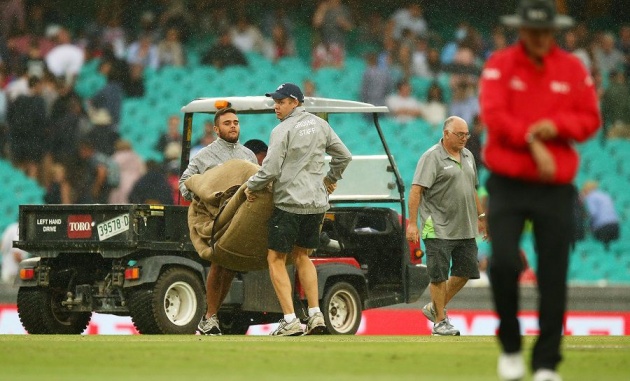A very English farewell
36.2 overs Afghanistan 111-7 (Shafiqullah 30, Jordan 2-13, Bopara 2-31) vs England
It was time for England to bid farewell to the World Cup and Sydney dutifully laid on a hangdog English day, more downcast than overcast, ravaged by rain. With Afghanistan's batsmen incapable of lifting the gloom, England accepted the regular fall of wickets like marker points en route to the airport and a glum flight home.
When rain intervened for a third time, and eventually curtailed Afghanistan's innings at 111 for 7, the possibility of an abandonment left England facing potentially their worst record in a World Cup: they have never before won fewer than two games. It would at least have the slight consolation of meaning the Bangladesh defeat ultimately did not matter - even with victory England would still not have qualified.

Even holding such a position of strength, if they did manage to get back on the field, they would have been best advised not to look too closely at the statistics. During this World Cup, Afghanistan's pace bowlers have taken more wickets, at lower cost and with a faster strike rate.
Afghanistan has built an international team out of nothing because of an innate love for the game. England have the resources, but the nation - especially young people - has rarely been more disconnected with its traditional summer game. Two very different challenges ahead. Afghanistan are desperate for matches; England are so insanely overstocked with fixtures that they play another associate nation, Ireland, the day after they return from a tour of the Caribbean. The first ODI between these two nations could hardly have drawn a starker contrast.
Those anticipating that Afghanistan's ingénues would inflict further misery on England found little cause for optimism. By the time the 50 was raised, 21 overs had slipped away with all the appeal of congealed farmer's broth, Afghanistan had lost four wickets and the mood of the innings was set.
There was some swing and seam to hearten England - there was reason to suspect that the movement would have been more pronounced for an attack of higher calibre - and their pace attack did not have to produce anything out of the ordinary to cut deeply into Afghanistan's order.
Stuart Broad and James Anderson, who was potentially playing his last ODI, sought respectability in a match that, emotionally, they would have preferred not to fulfil. There was no sense of fun; this was simply a job of work. The new ball was polished not with love and attention, but as if it was a dreary relationship that was just going through the motions. Anderson hit 144kph, a sliver below 90mph, surely his fastest ball of the tournament.
Two bad shots brought England's new-ball pair a wicket apiece, both taken by Joe Root at first slip. Nowraz Mangal fenced weakly at a wide one from Anderson; Javed Ahmadi offered an angled bat to Broad. As Nasir Jamal defended in search of stability, it was clear that all Afghanistan's romance rested with the ball, not the bat.
Chris Jordan, bounding warily to the wicket like a rabbit through a cornfield, also benefited with two wickets: Afghanistan's batsmen offering their delights like ripe carrots. Afsar Zazai's furtive push forward brought an edge to Jos Buttler and Samiullah Shenwari, one of Afghanistan's brighter stars with the bat in this World Cup, drove to Morgan, diving forward at point.
Injuries to two England allrounders, Moeen Ali and Chris Woakes, provided an opportunity for two players who perhaps were involved in an England ODI for the last time. Ravi Bopara and James Tredwell might conceivably suffer from the urge to rebuild in the aftermath of a major tournament. Both took the chance to touch up their international record; smiles perhaps for the final time.
Jamal had crawled to three from 31 balls when he successfully reviewed umpire Ravi's decision that he had fallen to a leg-side strangle. He quickened slightly thereafter, as if in celebration, although not the sort of celebration to which you would welcome an invitation. The combination of a second rain stoppage and a humdrum length ball from Bopara ended his excrutiating innings on 17 from 52 balls. A flurry from the captain, Mohammad Nabi, ending with a slog to mid-on; a fine diving catch at fine leg by Bopara, making light of Jordan's presence, to silence Shafiqullah. Then the rain arrived for a third time, heavier this time.
So much has been written about Afghanistan, so much joy understandably taken in their journey to join cricket's elite. But as the rain glinted against the floodlights, and two eliminated sides trying to keep body and soul together kicked their heels in the dressing rooms, and a sparse crowd became yet sparser, there was little joy to be had.
Somebody doubtless soon piped up with a question, for want of anything better to talk about, just how long Duckworth Lewis had been joined by Stern, and for what reason. Cricket talk, but not for the masses.
David Hopps is the UK editor of ESPNcricinfo @davidkhopps



